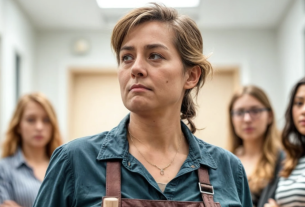Anya Karpenko jolted awake at half past six to the bang of the front door. Igor had slipped out the way he always did—no kiss, no goodbye, just the blunt punctuation of a life shared in silence. She rolled onto her other side, pressed her face into the pillow, and tried to drift back under. But the numbers wouldn’t let her—the grid in her mind kept lighting up: how much more to stash away, how many months until she could buy a place and finally start living like it was hers.
Three years of marriage had trained Anya not to expect conversation. Igor scrolled through his phone at dinner, never once asking how her day went. Eventually the quiet stopped hurting and just… settled. She worked as an accountant at a construction firm, tracked every coin, and fed a private dream of a door with her name on the papers. The two-room rental had long since stopped feeling like home: paper-thin walls, a landlord who nagged, rent that only climbed.
“We’ll move soon,” she told Igor, showing him listings on her phone. “Another six months and we’ll have the down payment.”
He nodded without looking up, muttered something that could have been agreement. He drove for a logistics company—decent wage, tight fists when it came to anything that wasn’t cigarettes, beer with his friends, or gas for his cherished car.
Anya didn’t complain. You stop talking to a wall when you learn it won’t answer. She saved. She compared. On weekends she toured apartments, snapped photos, made spreadsheets. Igor never came.
“You’re better at this stuff,” he’d wave her off. “Whatever you pick, we’ll buy.”
A gray February day began like any other. Anya was at her desk, tying up the previous month’s accounts, when Igor’s phone started buzzing on their kitchen counter—he’d left it behind beside an abandoned half-sandwich. The calls kept stacking. The name on the screen: Max.
She knew Max—Igor’s school friend with the sly smile, now selling something somewhere. Tall, wiry, always a joke Anya couldn’t find the humor in.
“Hi, this is Anya,” she answered on the third try. “Igor forgot his phone. Is it urgent?”
“Anya! Hey, hey.” Max sounded bizarrely chipper. “Nothing big. Just wondering how it’s going with the apartment. He said you two were buying soon.”
“Hopefully by summer,” she said. “Why?”
“Just curious. He sounded real pleased—like he snagged something for free.”
The note in his voice made her skin tighten, but she let it pass. They said goodbye. That evening she handed Igor his phone.
“Max called about the apartment,” she said.
Igor’s eyes flicked to the screen and away. His jaw set; he said nothing.
“Hungry?” she tried.
“Not hungry,” he grunted, retreating to his room.
Anya lifted a shoulder. In three years, his moods were the one thing that never surprised her.
A week later, everything tilted.
He left the phone again. This time Anya silenced the calls and told him, when he asked that night, that nobody had tried to reach him. He frowned, took the phone into the bathroom, and whispered into it, voice low enough that only the tension carried through the door.
“I’ll be late tomorrow,” he said when he emerged. “Big shipment.”
She only nodded. By then, she was past caring.
The next morning he left, then returned half an hour later—forgotten paperwork. Anya was in the shower and heard him rifling through drawers, then the front door slam again. She stepped out and spotted his phone on the floor, probably knocked loose in the hurry. She bent to set it on the table—and saw the screen was unlocked. Several new messages from Max glowed in the banner.
She wasn’t going to read them. She truly wasn’t. She meant to set the phone down and walk away. But her eyes snagged on the first line that hung there like a hook:
“Sure she doesn’t suspect? She acted weird yesterday…”
Anya’s heart tripped. Her thumb tapped without permission.
The thread was long. She read—and felt the room tilt.
Igor:
“Everything’s on schedule. She’s almost got the down payment. Should close by May.”
Max:
“And right after you buy?”
Igor:
“Obviously. Married property means half is legally mine. Then I file and take my share.”
Max:
“Genius, man. What if she catches on?”
Igor:
“She won’t. She’s so trusting it’s almost cute. Saving for OUR place three years—but really for mine. Well, ours—remember the auto shop?”
Max:
“I remember. Good entry point. With your cash, we’re set.”
Igor:
“Exactly. She just needs to hurry up and choose. I’m sick of pretending to be the caring husband.”
Max:
“And the kid thing? She wanted one, right?”
Igor:
“Shut it down. Kids just complicate property splits. Easier with none.”
Max:
“Cold, Igor. Three years with a woman and not an ounce of pity.”
Igor:
“Pity? For what? She’ll still walk away with half. I get free. I’m done with her spreadsheets and daydreams.”
Anya laid the phone on the table with trembling hands. Her head hummed; her vision fuzzed at the edges.
Three years.
Three years building a future with a man counting down to leave. Three years saving for “us,” while he sketched how to siphon it for himself.
She sat down, spine straightening as if pulled by wire. Igor would be back—if not for her, then for the phone. She needed a plan. Which one, she didn’t know yet.
She photographed the worst exchanges, put his phone exactly where she’d found it, and waited.
He returned twenty minutes later, irritable and distracted.
“Where’s my phone?” No hello.
“On the floor,” she said evenly. “By the desk.”
He grabbed it, scanned the screen, and some muscle in his face relaxed. “I’m heading out. Late night.”
“Okay,” she said.
When the door clicked shut, her tears came hot—and then stopped. Anger scorched through, burned clean, and left something colder behind: resolve. She had proof. She had time. She would not be a mark in his ledger.
Anya opened her laptop. She read family law, division of assets, legal definitions of personal versus joint funds, evidentiary standards. By lunch she knew more about marital property than she had about her own marriage.
That evening Igor came home the way he always did—late, detached. Anya met him with dinner and a gentle voice.
“How was your day?” She poured tea.
“Fine,” he said to his plate. “Yours?”
“Good.” Anya sipped. “I spoke to a realtor. He says we should register the apartment under one name to optimize taxes.”
Igor’s eyes lifted, interest flaring. “Whose name?”
“Depends on who’s got the higher official income,” she said. “What’s on paper for you?”
“Twenty-eight,” he said, too quickly.
She knew the off-the-books portion was higher. “Mine’s thirty-five,” she replied lightly. “We should put it in my name.”
He mulled it, shrugged. “Does it matter? We’re married. It’s all joint.”
“Of course,” she agreed. “Just smoother with the tax office.”
For days she laid breadcrumbs: a mention of a “good lawyer,” of wanting everything filed correctly, of notarizations and stamps. Igor nodded, but the word “documents” made his jaw pulse.
Then he made his move.
On a Saturday, he announced a trip to help his parents at their dacha. “I’ll be back late.”
Anya saw him out. An hour later her sister Lena arrived, all clear eyes and bracing honesty. Lena had never pretended to like Igor. “Cold,” “wooden,” “what do you see in him” were her greatest hits.
“You’re pale,” Lena said, stepping inside. “What happened?”
“Just tired,” Anya tried.
“Tired of what—the iceberg you married?”
Usually Anya would defend him. Today she didn’t. She told Lena everything: the messages, the plan, the years of silence.
“Scum,” Lena said, voice flat. “So. What now?”
“I don’t know.” Saying it out loud made her feel younger and older at once.
“You don’t need to ‘think,’ you need to move,” Lena said. “Do you have proof?”
“I took photos.”
“Good. And the savings?”
“In my account. All mine.”
“Perfect. Tomorrow you see a lawyer. And you buy before he knows you’re awake.”
“But—” Anya started.
“But what?” Lena cut in. “You pity him? He harvested three years of your life and planned to cash you out.”
Anya rubbed her eyes. She didn’t pity Igor. She mourned the routine that had pretended to be love.
Lena squeezed her hands. “You’re kind. Be kind to yourself. Now be smart.”
On Monday, Anya took a day off and met with a young attorney in a sharp navy suit. The woman listened, then nodded slowly.
“It’s messy, but you have a real shot,” she said. “The texts show intent. If you can document the funds as yours, we can argue this was purchased with personal income.”
“But I saved during the marriage.”
“That’s okay. The key is to tie the money to your earnings. Salary slips?”
“Yes.”
“Great. If he didn’t contribute substantially and it’s documented, we argue the property is yours. You must keep quiet, though. No tip-offs.”
“How do we structure the deal?”
“In the contract, note the purchase is made with funds from one spouse’s personal income and register in your name. His role is simply spousal consent.”
Anya left with a checklist and a steadier heartbeat.
Igor was waiting in the kitchen, a cigarette burning low between his fingers—a habit he rarely brought home. “Where were you?”
“Errands,” she said. “Why?”
He shrugged. “Just asking.”
At dinner he probed. “When do you want to buy?”
“In a month or two. I want enough for the down payment and some repairs.”
“Why wait?” He leaned in. “Prices are climbing. Better to move now.”
He was pressing. He was ready. “Maybe you’re right,” she said mildly. “I’ll think about it.”
The next day she toured a one-bedroom in a new build she’d been eyeing for months: good layout, good light, sellers in a hurry. She scheduled a second viewing and brought Igor along.
“Fine,” he said after a cursory glance. “Take it.”
“Not a two-room?” she asked, surprised.
“Why?” he shrugged. “This is enough. A roof is a roof.”
Of course he wanted it fast. A faster deal meant a faster divorce.
By Monday, the paperwork was in motion. The lawyer drafted the language to register the apartment to “Anya Karpenko from funds derived from her official salary,” with Igor’s spousal consent attached.
“Why is it written like that?” Igor asked, scanning the draft.
“Lawyer’s advice,” Anya said. “Cleaner for the tax office.”
He shrugged and signed.
Closing was set for Friday. All week Anya lived inside a taut wire. Sometimes she was sure he could smell the trap; sometimes his apathy fooled her.
On Thursday, Max called. “Anya, hi. Is Igor around?”
“No.”
“Just wanted to say congrats on tomorrow.” His tone had a smear of laughter in it.
“Yes. Tomorrow,” she said, and hung up. He wasn’t laughing at her anymore, she decided. He just didn’t know it yet.
Friday morning they went to the service center. Anya’s face was composed; her stomach was in knots. Igor was almost cheerful.
Signatures. Stamps. Copies. Anya’s hand trembled once; Igor’s smile barely moved. “Now we’ve got our own place,” he said, draping an arm over her shoulders.
“Yes,” she said. “Ours.”
They drove home in silence. Anya wondered how soon he’d do it. A month? A week?
Sooner.
Monday at breakfast, Igor cleared his throat. “We need to talk.”
Anya’s chest tightened, then steadied. “About what?”
“Us. We’re… drifting. Different goals. I feel… constrained.” He strung the platitudes like beads, not looking at her as he ended with, “It’s better to separate. Peacefully. No drama. You understand there’s nothing left?”
“I understand,” she said.
He blinked. He’d braced for begging, for tears. Instead: still water.
“Right. I’ll file today,” he said. “We split the apartment down the middle. No issues?”
“No issues,” she said with a small nod.
He paused, searching her face for the trap and missing it right under his feet. “Okay. I’m off.”
The door closed. Anya dialed her lawyer. “He’s filing,” she said. “Today.”
“Good,” the lawyer replied. “Ready for the next part?”
“Ready.”
A month later, they were in court for division of property. Igor arrived with a lawyer and a satisfied tilt to his mouth. Anya came alone with a tidy folder and a quiet gaze.
“The apartment was purchased during the marriage,” Igor’s attorney began. “It is joint property.”
“I object,” Anya said, rising. “The apartment was bought solely with my personal funds.”
She produced salary slips, bank statements, budgets—the paper trail of three disciplined years. Then she set down printed screenshots of the messages with Max.
“My ex-husband intended to divorce immediately after purchase to claim half,” she said. “These demonstrate premeditation.”
Igor blanched. His lawyer skimmed the pages and stiffened. “These could be fabricated,” he protested.
“Then the defendant can submit his phone for forensic review,” Anya said evenly.
The hearing stretched for nearly two hours. In the end, the judge recognized the apartment as Anya’s personal property based on the origin of funds and the demonstrated intent to abuse the marital regime.
Igor left the courtroom with clouds stitched across his face. He caught Anya on the steps.
“You knew?” he asked.
“From the start.”
“And kept quiet?”
“What would noise have changed?” she said. “You would’ve done it anyway.”
He stared at her as if re-learning her. “I thought you were too simple for games.”
“Then you didn’t know me,” Anya said.
They stood a moment under the courthouse sky—anger and confusion in his eyes; steadiness, and something like relief, in hers.
“So be it,” he muttered.
“So be it,” she agreed.
He walked to his car. Anya watched him go, then called Lena.
“It’s done,” she said. “The apartment is mine.”
“Attagirl,” Lena said. “How do you feel?”
Anya searched for the word. Relief? Sadness? Nothingness?
“Free,” she said at last. “For the first time in three years—free.”
That evening she sat in her apartment—truly hers now—and drank tea. The court ruling and divorce papers lay on the table, edges aligned. Tomorrow she’d go to work, meet friends, make new plans.
She stood by the window. Outside, the city pulsed—streetlights, tires on wet asphalt, people moving toward somewhere that mattered. Life had never paused.
She let herself wonder, briefly, about Igor. A bar with Max? A speech about unfairness? Or already blueprinting the next scheme?
She shrugged. Not her problem.
She opened a fresh notebook and wrote:
Change the locks.
Find a reliable realtor.
Prep for sale.
Because one truth had settled in her bones: life is too short to live small. Three years for a one-bedroom? Fine. Now she’d aim for three rooms. A better district. Trees and a park out the window.
She closed the notebook, turned off the light, and smiled into the dark. Tomorrow, a new chapter.
This time, it would read exactly the way she wrote it.



